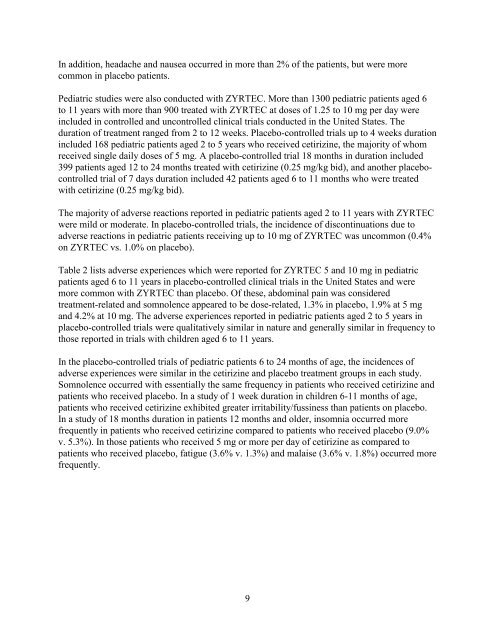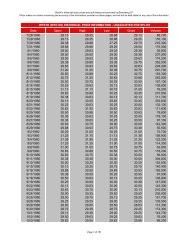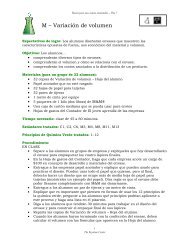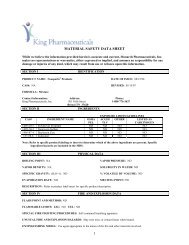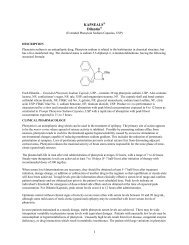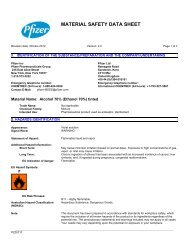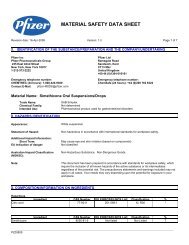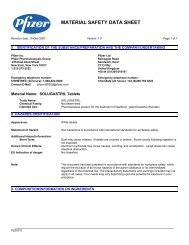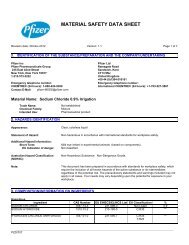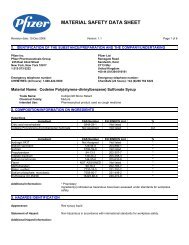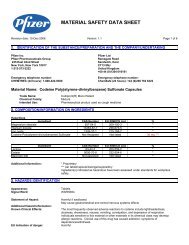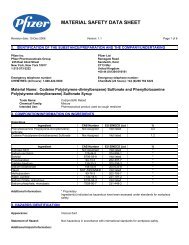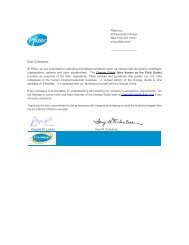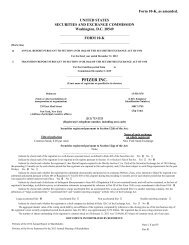ZYRTEC® (cetirizine Hydrochloride) Tablets, Chewable ... - Pfizer
ZYRTEC® (cetirizine Hydrochloride) Tablets, Chewable ... - Pfizer
ZYRTEC® (cetirizine Hydrochloride) Tablets, Chewable ... - Pfizer
Create successful ePaper yourself
Turn your PDF publications into a flip-book with our unique Google optimized e-Paper software.
In addition, headache and nausea occurred in more than 2% of the patients, but were more<br />
common in placebo patients.<br />
Pediatric studies were also conducted with ZYRTEC. More than 1300 pediatric patients aged 6<br />
to 11 years with more than 900 treated with ZYRTEC at doses of 1.25 to 10 mg per day were<br />
included in controlled and uncontrolled clinical trials conducted in the United States. The<br />
duration of treatment ranged from 2 to 12 weeks. Placebo-controlled trials up to 4 weeks duration<br />
included 168 pediatric patients aged 2 to 5 years who received <strong>cetirizine</strong>, the majority of whom<br />
received single daily doses of 5 mg. A placebo-controlled trial 18 months in duration included<br />
399 patients aged 12 to 24 months treated with <strong>cetirizine</strong> (0.25 mg/kg bid), and another placebocontrolled<br />
trial of 7 days duration included 42 patients aged 6 to 11 months who were treated<br />
with <strong>cetirizine</strong> (0.25 mg/kg bid).<br />
The majority of adverse reactions reported in pediatric patients aged 2 to 11 years with ZYRTEC<br />
were mild or moderate. In placebo-controlled trials, the incidence of discontinuations due to<br />
adverse reactions in pediatric patients receiving up to 10 mg of ZYRTEC was uncommon (0.4%<br />
on ZYRTEC vs. 1.0% on placebo).<br />
Table 2 lists adverse experiences which were reported for ZYRTEC 5 and 10 mg in pediatric<br />
patients aged 6 to 11 years in placebo-controlled clinical trials in the United States and were<br />
more common with ZYRTEC than placebo. Of these, abdominal pain was considered<br />
treatment-related and somnolence appeared to be dose-related, 1.3% in placebo, 1.9% at 5 mg<br />
and 4.2% at 10 mg. The adverse experiences reported in pediatric patients aged 2 to 5 years in<br />
placebo-controlled trials were qualitatively similar in nature and generally similar in frequency to<br />
those reported in trials with children aged 6 to 11 years.<br />
In the placebo-controlled trials of pediatric patients 6 to 24 months of age, the incidences of<br />
adverse experiences were similar in the <strong>cetirizine</strong> and placebo treatment groups in each study.<br />
Somnolence occurred with essentially the same frequency in patients who received <strong>cetirizine</strong> and<br />
patients who received placebo. In a study of 1 week duration in children 6-11 months of age,<br />
patients who received <strong>cetirizine</strong> exhibited greater irritability/fussiness than patients on placebo.<br />
In a study of 18 months duration in patients 12 months and older, insomnia occurred more<br />
frequently in patients who received <strong>cetirizine</strong> compared to patients who received placebo (9.0%<br />
v. 5.3%). In those patients who received 5 mg or more per day of <strong>cetirizine</strong> as compared to<br />
patients who received placebo, fatigue (3.6% v. 1.3%) and malaise (3.6% v. 1.8%) occurred more<br />
frequently.<br />
9


